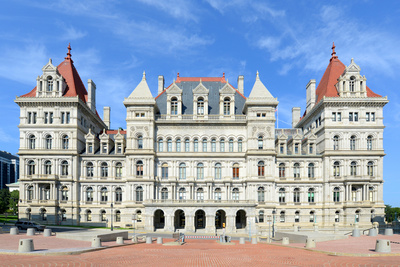
Data Centers, Tax & Budgets
States Rethink Data Center Tax Incentives as Costs Soar
February 4, 2026 | Morgan Scarboro
August 3, 2021 | Ryan Maness
-ad868a-1200px.jpeg)
Key Takeaways:
Last month we published an analysis of four states that represent a new trend in how Democratic state lawmakers are approaching tax policy. This month we are taking a look at how Republican-controlled states considered tax policy this year. While polarization trends are pushing both parties further from the center, this does not seem to be affecting Republicans and Democrats in the same way. While Democratic lawmakers are increasingly comfortable pushing for significant new taxes or tax increases, Republicans generally have not changed their perspective on ideal tax policy. Surveying a few GOP states which were active in the tax policy arena in 2021 demonstrates the different approaches that conservatives tend to take:
North Carolina pursued aggressive, across-the-board tax reductions that sponsors argued would spur economic growth.
Florida lawmakers, who are generally averse to making big changes to their tax code, paired new sales tax nexus rules with cuts to the commercial rents tax.
West Virginia sought to cut income taxes and increase taxes on businesses.
Senate Leaders in North Carolina took 2021 as an opportunity to push for major changes to their state’s income tax system, continuing a decade-long restructuring. In a May substitute to HB 334, tax reformers proposed phasing down the personal income tax rate, phasing out the corporate income tax, simplifying the corporate franchise tax, and changing tax provisions for certain pass-through entities.
The amended bill passed the upper chamber with bipartisan support, despite a Democratic effort to remove the business tax provisions. Governor Cooper (D) has said that he cannot support the bill in its current state, arguing that the state should not approve “sweeping tax breaks for corporations and the wealthiest among us instead of investments in our hard working families and communities.” House Democrats expressed their opposition for similar reasons.
Amid this political gridlock, legislative progress stalled, leading tax cut proponents to announce in June that they would suspend their advocacy for most of the summer. The ultimate fate of SB 105 (which we are now told is the operative vehicle) remains unclear, but lawmakers are expected to resume their work in August and tax reform should play a central role in those deliberations.
In a year when many other Republican tax leaders decided to defer their tax agenda — either because of revenue uncertainty or concerns about restrictions on the use of federal aid — North Carolina represents one of the more significant efforts to cut taxes so far this year. While unique among states this year, HB 334 and SB 105 follow into a tradition of Republican tax legislation aimed at significantly reducing income taxation across the board. In contrast to the increasingly common Democratic view that higher taxes can be a good in and of themselves, this Republican tradition holds that lower tax rates will lead to greater economic growth in the long-term even if state revenues fall in the near-term. North Carolina was the exemplar this year, but Georgia, Kentucky, Oklahoma, and other Republican-majority states have pursued a similar path.
Coming into 2021, only two states — Florida and Missouri — had not yet passed Wayfair legislation to authorize the collection of sales taxes on remote and internet transactions. Florida previously only had limited debate on the issue, with many lawmakers arguing that authorizing additional sales tax collection authority would be tantamount to a tax increase. Dubbing this policy as a tax hike made it dead on arrival in both the legislature and the governor’s office.
In light of this political reality, bill proponents redoubled their efforts to accurately characterize the legislation not as a tax increase, but rather as fostering the collection of taxes which were already legally due and payable, which had already been adopted by a couple of dozen Republican majority states, and which would level the playing field for state businesses. These efforts paid off and the 2021 version of the bill (SB 50) began to make its way through the legislative process.
Even as an increasing roster of legislators endorsed the measure, everyone acknowledged that the final, most difficult hurdle would be Governor DeSantis (R), who had expressed his opposition both during his governorship and his time in Congress. Apart from any policy qualms, the governor has made no secret of his long-term political aspirations and was always going to fight to protect his reputation as an opponent of tax hikes.
To gain the support of the governor, lawmakers added language to cut the tax on commercial rents, ensuring that SB 50 would be revenue neutral. Satisfied, Governor DeSantis signed off on the bill on April 20.
The Supreme Court issued its decision in South Dakota v. Wayfair in 2018 and states — Republican and Democrat alike — rushed to pass laws to gain access to this new revenue, but Florida’s reticence reflects a very particular kind of conservative approach to tax policy: the tax system should be as simple as possible and any change that raises revenue should be considered a tax increase. Florida may be the paradigmatic example of this ethos, but Idaho and Tennessee are also two other similar states when it comes to tax policy.
West Virginia Governor Justice (R) signaled in January that one of his top priorities in the 2021 legislative session was to eliminate (or at least significantly reduce) the personal income tax. The governor believed that removing the tax was essential to bolstering the state’s flagging population growth. His proposed “pay-fors” changed throughout the course of the session, but what made the governor’s legislative pitch unique was that he repeatedly said that successful businesses needed to do their part to “pull the rope” with the rest of the state by paying new sales taxes on professional services and natural resource extraction. Tax professionals have always extolled the virtues of “low-rates, broad bases,” but they’ve also said at the same time that business inputs should not be subject to sales tax. We’ve rarely — if ever — seen a Republican governor call for the burden of broadened tax bases to fall on the business community.
Despite the governor’s insistence, the legislature’s reaction to his proposal (HB 3300) was mixed. Senate leaders were onboard with the governor’s overall income tax elimination project, though they favored a more incremental approach. House leaders were skeptical from the start, saying that they supported tax reductions in theory but they believed that the governor’s proposal was too aggressive.
The debate between Governor Justice, the House, and the Senate went on for weeks, with each party favoring a different approach. Throughout, the governor held a series of town halls where he reiterated his populist message that individual taxpayers would end up better off, even if businesses large and small would end up paying more.
In a final bid to win over the necessary support, the governor held a summit with leaders of the House and Senate, where he offered a new version of this plan, but the gambit was unsuccessful and the legislature adjourned without any major tax changes. Governor Justice said he planned to call a special session to take up the issue again, but to date no official plans have been announced.
While Governor Jim Justice is an idiosyncratic politician, it’s still notable that a Republican governor would put the full weight of his office behind a tax bill purposefully designed to increase taxes on businesses. Former President Trump often used populist rhetoric, but with HB 3300 Governor Justice walked the populist walk. Time will tell if any other party leaders follow in his footsteps, but his efforts represented a new Republican approach to messaging on tax policy.
In all three of these states, the policy goal was to keep tax rates as low as possible, but some Republican lawmakers are increasingly of the view that, when it comes to “Big Tech,” higher taxes may be preferable.
As we’ve discussed before, 2021 saw a proliferation of bills seeking to levy new taxes on digital advertising, datamining, and social media companies, with legislation coming from both Democrats and Republicans. These bills’ sponsors often justified their proposals by saying that they were necessary to promote fairness in the tax system, an argument that is common among left-leaning politicians, but more unusual for the GOP. From state capitols to the halls of Congress, however, Republicans are increasingly arguing that conservatives are facing censorship or worse by tech platforms and that higher taxes could be a way of curtailing this trend.
So far this rationale has only led to a handful of introductions across the country and none of these bills have become law, but recent statements from Texas Governor Abbott (R) and Governor DeSantis could presage increased activity in the future.

February 4, 2026 | Morgan Scarboro

January 21, 2026 | Morgan Scarboro

January 6, 2026 | Morgan Scarboro